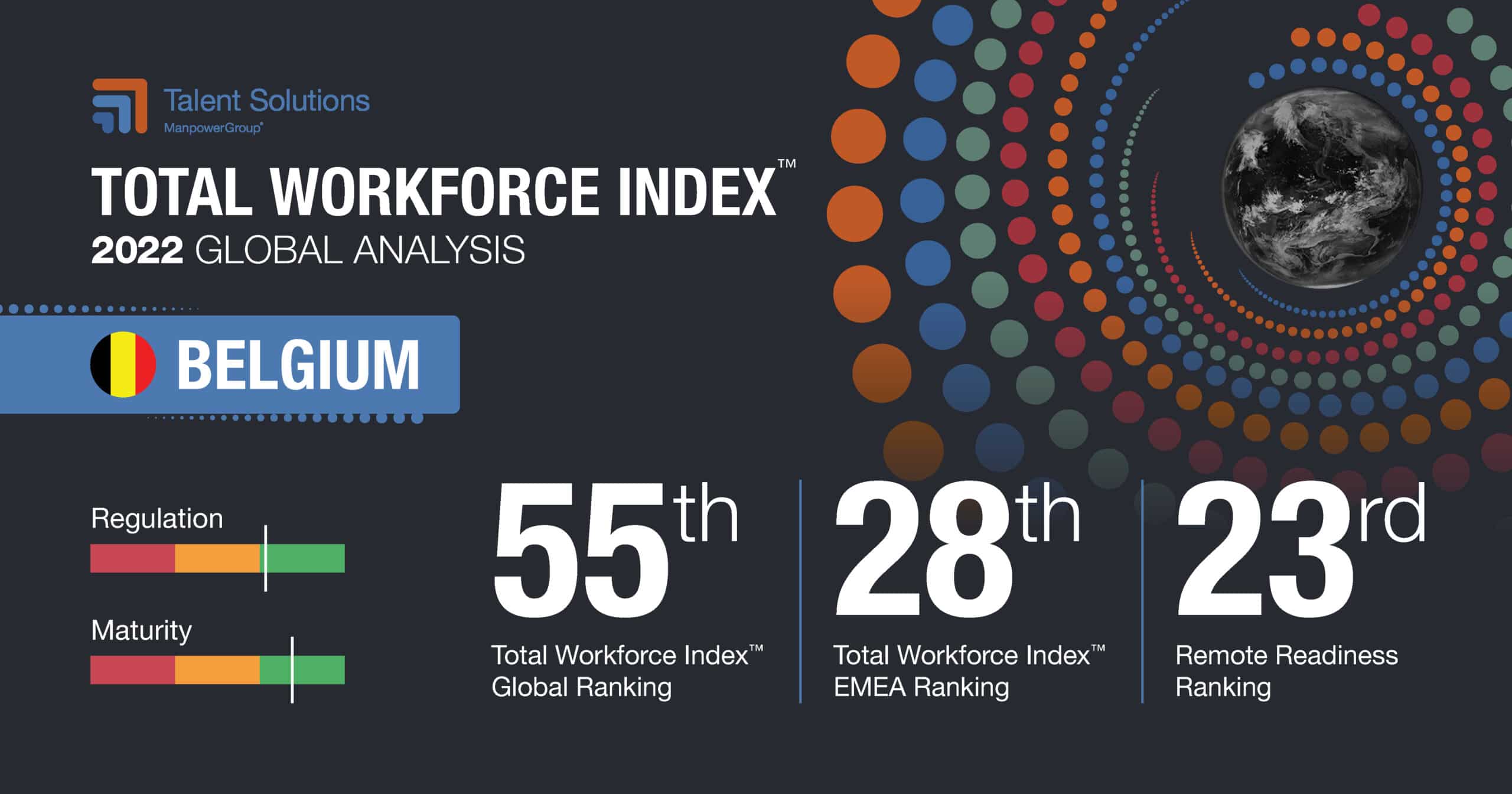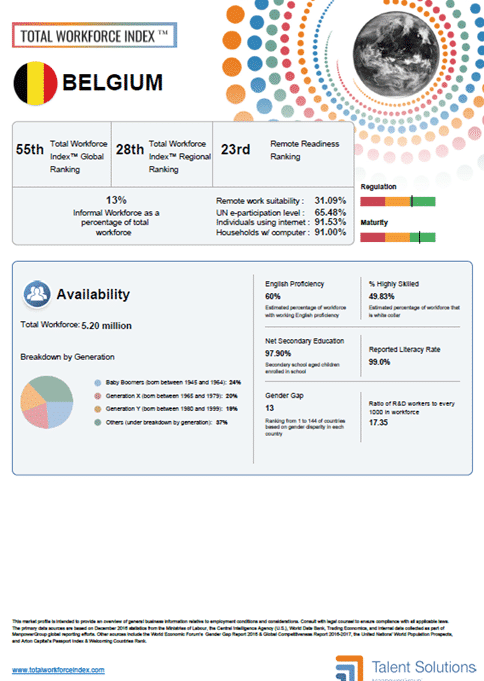Belgium ranked 55th (out of 64 countries) in the 2022 ManpowerGroup Total Workforce Index

ManpowerGroup Belgium ESG Report 2021-2022 : Making Work Meaningful For A More Sustainable World
13 December 2022
Belgian employers plan to slow the hiring pace in Q1 2023, but continue to show resilience
5 January 2023Belgium falls 13 places in this ranking in comparison with last year, indicating a decline in the attractiveness of our country and the urgent need for a thorough reform of our labour market
ManpowerGroup has published the ninth edition of its Total Workforce Index™ study. This Index measures and compares the relative ease of sourcing, hiring and retaining contingent and permanent workers in 64 labour markets around the world. ManpowerGroup experts analyzed 200 key factors related to 4 categories in each country: Workforce Supply, Cost Efficiency, Regulation, and Workforce Productivity. For 2022, Belgium is ranked 55th (out of 64) globally and 28th (out of 33) in the EMEA region. This is a significant drop of 13 places at world level and no change (drop of 1 place) at regional level compared to the previous edition.
As companies and governments have adjusted to the impacts of the COVID-19 pandemic, today’s labour markets are characterized by intense competition for skilled workers. Demand for talent far exceeds supply, with 76% of companies globally reporting talent shortages and difficulty hiring, according to ManpowerGroup’s 2022 Talent Shortage Survey(1).
But this is not the only factor that influences the choice of location for an investment or the implementation of an entrepreneurial project. The world of work continues to change rapidly and the new edition of ManpowerGroup’s Total Workforce Index, which measures the attractiveness of a country’s workforce, has taken these changes into account by adjusting the weighting of the 200 factors studied or by introducing new indicators.
This year’s revamped TWI places more emphasis on the impacts of remote work, the growing willingness and flexibility of employers to scale back education requirements and choosing to skill candidates on the job. There’s also increased focus on the age of the workforce. As older workers leave the labour market, more companies are cultivating sustainable populations of talent by prioritizing the availability of large pools of Gen Z and millennial workers. In addition, cost of living indices, wage inflation rates, and exchange rate volatility are new factors introduced into the TWI based on the significant impact of these issues on organizations and their workforces. The study also assessed the influence of geopolitical instability following the war in Ukraine.
Belgium in 55th place (out of 64) worldwide and 28th place (out of 33) in the EMEA region (Europe, Middle East, Africa)
Globally, the United States, Singapore, Canada, Ireland, and Australia top the ManpowerGroup 2022 rankings, while in the EMEA region (Europe, Middle East, Africa), the top five positions are occupied by Ireland, the United Kingdom, Israel, Switzerland, and South Africa. In the Top 10, are three Nordic countries, Denmark (6th), Finland (7th) and Norway (8th). At the global level, the last three places are occupied by Honduras, Brazil, and Bolivia.
Belgium is ranked 55th (out of 64) in the world and 28th (out of 33) in the EMEA region. This is a significant drop of 13 places at global level and no change (drop of 1 place) at regional level compared to the previous edition.
Compared to other European countries, Belgium’s 55th place in the world is well behind Ireland (4th), the United Kingdom (6th), Switzerland (13th), Denmark (15th), Finland (16th), Norway (17th), Estonia (18th), the Czech Republic (28th), the Netherlands (33rd), Spain (35th), Greece (40th) and Portugal (42nd). Poland (51st), the Grand Duchy of Luxembourg (52nd) and Germany (53rd) follow in our footsteps. Only four European countries rank behind Belgium: Slovakia (57th), Turkey (58th), Italy (59th) and France (60th).
At global level, it is worth highlighting the rankings of China (11th), India (23rd), Japan (38th), and Brazil (63rd).
Urgent need for a thorough reform of the labour market
“The attractiveness of our country is declining and our survey once again highlights the urgent need for in-depth reform of the labour market in Belgium,” explains Sébastien Delfosse, Managing Director of ManpowerGroup BeLux. “Our active population, although highly qualified, is ageing, not flexible enough and still has a low employment rate: 71.6% with a strong disparity at regional level: 76.2% in Flanders, 64.8% in Brussels and 65% in Wallonia.”
“Furthermore, the introduction of new criteria in our study, such as inflation and increasing wage costs – notably via our indexation system – hampers the competitiveness of our labour market and handicaps Belgium when international groups make investment decisions and choices. But this spectacular decline in Belgium is not an isolated case, as the survey reveals that our main European partners are facing the same difficulties – Germany, France, and Italy – whereas other countries, such as the United Kingdom, the Nordic countries, and the Netherlands seem to be better able to resist the increased competition between labour markets at the global level in assessing the attractiveness of their workforce. »
Belgium is among the most mature labour markets.
ManpowerGroup’s analysis places Belgium in the group of the most mature labour markets. These markets have the largest number of ‘growth talents’ with digital skills (with at least 40% of the workforce highly qualified, 49.83% in Belgium) and a strong training infrastructure (upskilling and reskilling).
Belgium obtains the following scores for the 4 criteria studied: 16th place for Labour Availability, 62nd place for Labour Cost (Switzerland being in last place), 53rd place for Regulatory Framework and 34th place for Productivity. Finally, our country achieves a reasonable 23rd place on the Remote Readiness factor. This criterion evaluates the different dimensions of telework such as the number of people able to work remotely, the access to technologies and the performance of communication tools, the control of risks linked to cybersecurity, the performance of the administration’s online services, the regulatory aspects or the human dimension (access to childcare services). Let us also highlight Belgium’s very good 13th place (out of 144 countries) on the criterion of gender equality.
A strategic tool
The Total Workforce Index helps ManpowerGroup Talent Solutions experts to assist companies with their long-term workforce planning strategies, including talent strategy, location strategy, remote work allocation, capacity planning, cost savings, market investments, organizational restructure, workforce mix, and sourcing strategy.
(1) ManpowerGroup Talent Shortage Survey (2022)
(2) Total Workforce Index™: ManpowerGroup Total Workforce Index™ (TWI) is an indicator of workforce potential in a specific market. It is based on a rigorous methodology and on a unique calculation formula that allows the analysis of more than 200 criteria related to 4 categories: Workforce Supply, Cost Efficiency, Regulation, and Workforce Productivity. It concerns information published by international organizations such as the World Bank, the OECD, and the World Economic Forum, and data collected by ManpowerGroup globally. In concrete terms, the Total Workforce Index measures the attractiveness of the labour markets of 63 countries around the world, by analyzing the relative ease of sourcing, hiring, developing, and retaining the talents they need to ensure their growth. The country with the highest score on this index is the one with the most attractive labour market.
More information
ManpowerGroup Talent Solutions Total Workforce Index 2022







